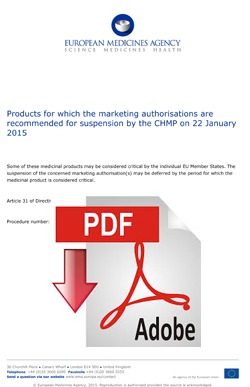Advertisement
Grab your lab coat. Let's get started
Welcome!
Welcome!
Create an account below to get 6 C&EN articles per month, receive newsletters and more - all free.
It seems this is your first time logging in online. Please enter the following information to continue.
As an ACS member you automatically get access to this site. All we need is few more details to create your reading experience.
Not you? Sign in with a different account.
Not you? Sign in with a different account.
ERROR 1
ERROR 1
ERROR 2
ERROR 2
ERROR 2
ERROR 2
ERROR 2
Password and Confirm password must match.
If you have an ACS member number, please enter it here so we can link this account to your membership. (optional)
ERROR 2
ACS values your privacy. By submitting your information, you are gaining access to C&EN and subscribing to our weekly newsletter. We use the information you provide to make your reading experience better, and we will never sell your data to third party members.
Pharmaceuticals
Europe Seeks Drug Suspensions
Drug safety: Agency says test data from India’s GVK Bio aren’t trustworthy
by Jean-Francois Tremblay
January 28, 2015
The European Medicines Agency (EMA) is recommending that member countries withdraw hundreds of generic pharmaceuticals that were tested by GVK Biosciences, an Indian contract research organization. Data generated by GVK formed the basis upon which the drugs were granted marketing approvals across Europe.
An inspection of GVK’s site in Hyderabad, India, by the French medicines agency found manipulation of electrocardiogram data, EMA says. The manipulation was systematic, occurred over at least five years, and involved a number of GVK staff members. The findings are serious enough to cast doubts on the integrity and reliability of other data generated by GVK, EMA adds.
EMA argues for the suspension of about 700 drugs marketed by some of the largest generic drug companies unless they can produce new and more reliable data within 12 months. The agency’s recommendation will become legally binding if approved by the European Commission.
The list of manufacturers affected includes industry leaders Sandoz, Teva Pharmaceutical Industries, and Mylan. Essential drugs that aren’t available from alternate suppliers will not be removed from the market.
GVK calls the recommendation “unprecedented and highly disproportional.” The company points out that the French medicines agency stated that the faulty electrocardiograms were not essential in demonstrating bioequivalence with the original drugs. Furthermore, EMA has said that patients’ health is not known to be at risk, GVK notes.
Problems with flawed drug-testing results have plagued India for several years now, but they normally stem from Indian drug companies. For example, in 2013 Ranbaxy Laboratories agreed to pay a record fine of $500 million for knowingly making false statements to the Food and Drug Administration about its drugs. And FDA issued a warning letter to Cadila Pharmaceuticals last October, partly for failing to ensure that test data are not tampered with.



Join the conversation
Contact the reporter
Submit a Letter to the Editor for publication
Engage with us on Twitter